

Helping children affected by their parent’s drinking in schools
This page gives information and advice for teachers and other staff helping children affected by their parent’s drinking in schools.
1 in 5 children in classrooms across the UK are affected by a parent’s drinking. Working together, we can help them know they are not alone.
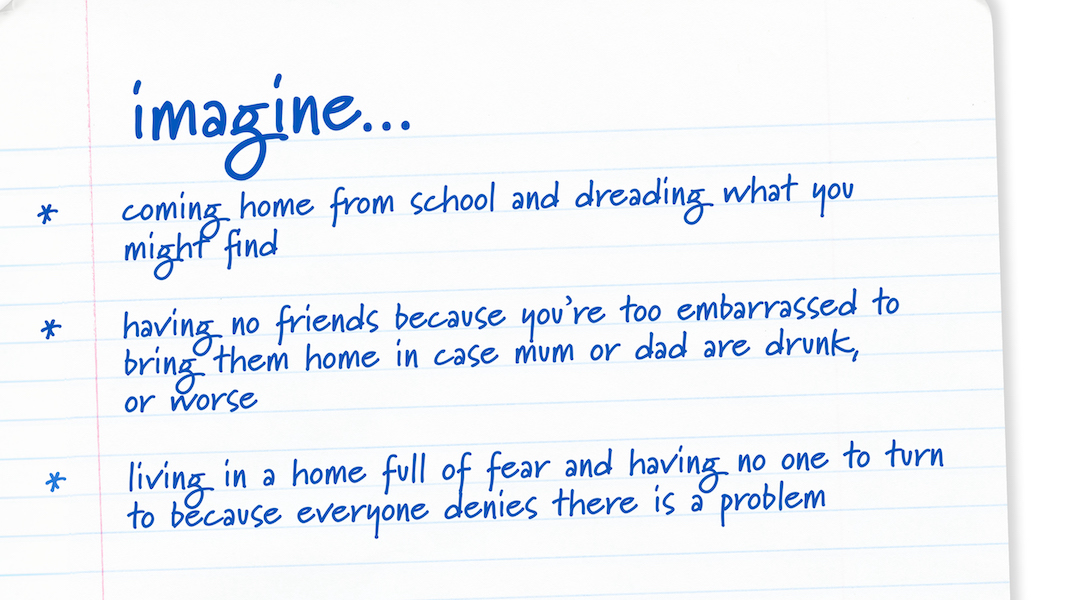
The impact of a parent’s drinking
Alcohol problems do not only affect the person drinking, but also everyone around them, including family and friends.
“My father is a heavy drinker. He turns up at school drunk and it’s extremely embarrassing in front of teachers and friends.”
Alice, 15
As the person drinking organises their life around alcohol, families adapt to cope with the drinking and associated behaviour.
The family rules don’t talk, don’t trust, don’t feel develop to keep the problem hidden from the outside world and protect the illusion of a ‘normal’ family.
Although some children are more resilient and better able to find ways to cope, all children are affected, even if they are not living in the same house, or if the parent is no longer drinking.
If unaddressed, problems can continue into adulthood.
“I became very protective and anxious for my mum. At 10 years old, I would not leave to go to school until Mum phoned me to confirm she had arrived safely at work.”
Anon
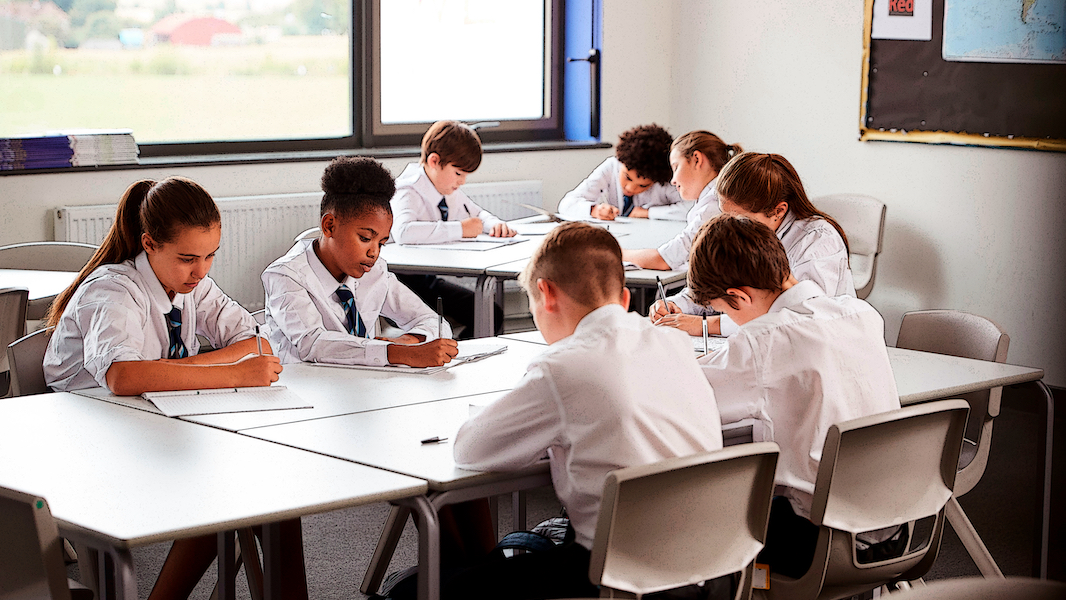
How might children affected by a parent’s drinking present in the classroom?
Parental substance misuse can lead to children and young people experiencing low self-esteem, behavioural and mental health problems, and poor academic performance and attainment.
Whilst problems are often hidden, children affected may:
- fail to get excited about an anticipated class trip or event
- act differently during PSHE drugs and alcohol education
- get upset around birthdays or holidays
- want time alone with or cling to a teacher or support staff
- have unrealistic expectations of other children
- be unable to comply with activities involving parents
- be fretful of school-parent contact
- talk back to a teacher or fight with other children
- have poor concentration or seem distant
- be inexplicably absent or perform poorly in school work
Any child may present with one or more of these features at certain times. However, the appearance of some in a consistent way could alert you that there is a problem.
“The quiet, compliant children may be struggling too. My strategy for survival was to expect nothing to ease the hurt of being let down, and be as amenable as possible to prevent any conflict.”
Lucy
Family roles
Families adapt to cope with addiction. Individuals can end up adopting roles to keep problems hidden and manage daily life.

Everybody tells me how ‘good’ I am at school. The positive attention I get seems to paper over the cracks at home.
It makes me feel good for a while, but the guilt and shame is overwhelming if I don’t live up to perfection. I’d love to go to university but I can’t leave my family.

I’m in the Head Teacher’s office every week for ‘bad’ behaviour. So long as everyone is telling me off then it draws attention away from chaos at home.
But it hurts being labelled a nuisance and things seem to go from bad to worse.
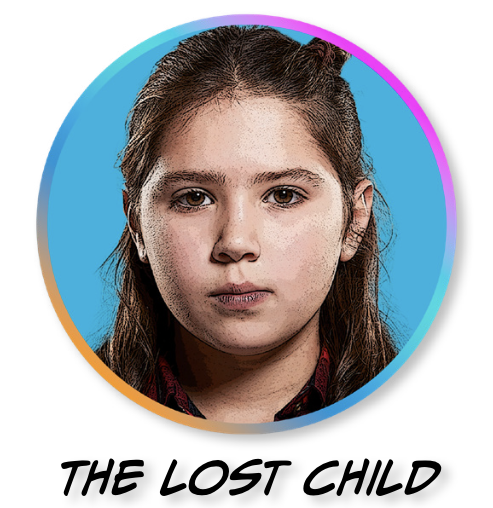
I stay out of the way at home. You’ll probably find me in my room with my pet rabbit and Switch, both things I adore.
No one really notices me at school. It’s a relief that people ‘like’ me enough to leave me out of the chaos. But I’m lonely and I don’t see a future for myself.

I try to make everyone laugh and lighten the mood at home. Even though I sometimes get told off, my teachers laugh along.
No one takes me seriously though, and playing the clown all the time is exhausting.
Adapted with permission from the work of Sharon Wegscheider-Cruse
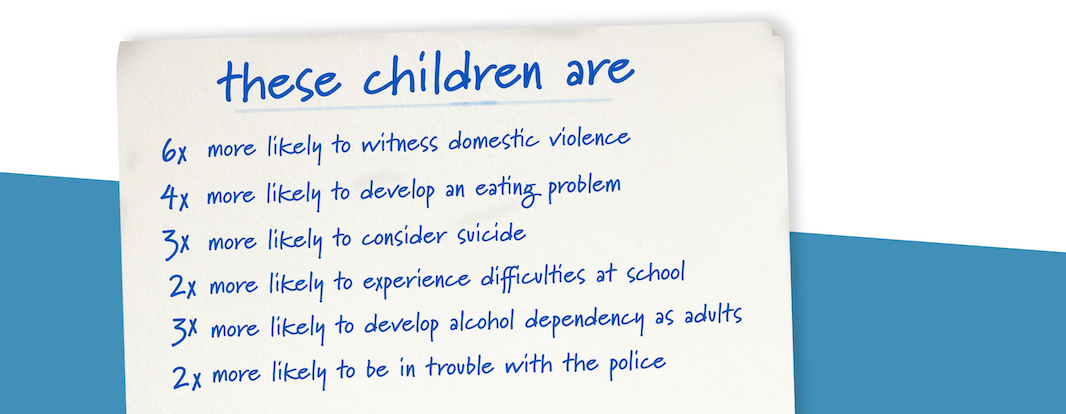
Frequent issues
Lack of money
Significant amounts of money are often spent on alcohol, which may take priority over everything else.
This leaves the rest of the family, sometimes one of the children, trying to make sure that their basic needs such as food and clothing can be met.
“The only source of income she’s got is by dad giving her money, and it’s unfair on him because he works so hard, and all she uses the money for is alcohol.”
Cathy, 15
Unpredictable behaviour
It is difficult to predict what state mum or dad will be in when they get home from school. They might be in a good mood, and wanting to do something fun. But they might be violent or irrational.
What confuses things further is when the whole family colludes to cover up for that person’s drinking. Many children feel unable to take friends home as they are embarrassed about their parent’s behaviour.
“Everything revolves around mum’s drinking. We pretend it’s not happening. I can’t stop thinking about what’s happening at home when I’m not there.”
Paul, 15
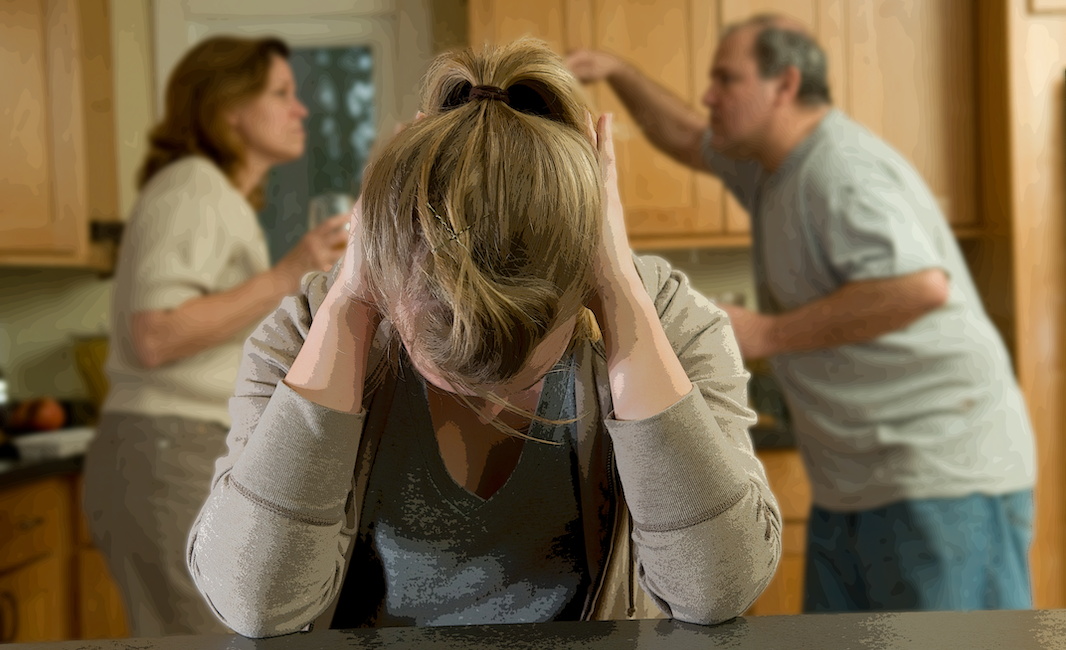
Aggression and violence
Some are exposed to arguments between parents or rage, violence and abuse on a daily basis, which become part of the unpredictable environment in which they live.
Many children may not experience obvious forms of abuse, but suffer from neglect or a chronic lack of the little things.
“My father was a huge man and always angry. He would sit up drinking late at night. My brother, sister and I were terrified of being beaten.”
Tim, 53
Did you know?
💬 Alcohol is a factor in 42% of violent crimes
💬 Parental drug or alcohol misuse is a factor in 61% of care proceedings
💬 Parental alcohol misuse is a factor in 37% of incidents of serious child injury or death due to abuse or neglect
(1) in England and Wales, ONS, 2020; (2) in applications to Cafcass, Guy, Blessington & Green, 2012; (3) Sidebotham et al. 2016
Anxiety and depression
Children struggling with parental alcohol problems may grow up feeling anxious, depressed, emotionally detached and socially isolated.
“I was constantly worried that if I wasn’t at home, she would have an accident. It affected my social life and friendships because I was always worried.”
SJ
Guessing at ‘normality’
Children who grow up around alcohol problems often know no
alternative. This may be the only ‘normal’ they have experienced.
Codependency, or adaptation to a dysfunctional family system, is a learned behaviour which is often passed from one generation to the next. Later in life, many children find themselves drawn towards others who have grown up in similar situations, and sometimes become dependent on alcohol themselves.
“If I asked why dad was lying in the middle of the kitchen floor with his eyes shut. I was told ‘nothing, everything’s fine’. I wondered if I could see something they couldn’t.”
Sam, 24
Guilt, shame, feeling to blame
It is common for children to feel that they have somehow caused the problem, and are to blame. Children often harbour the mistaken belief that they are responsible for their parent’s difficulties, and can therefore change them. Only the person drinking has the power to change their behaviour.
Our research found that these children are 6 times more likely to feel responsible for conflict in the home, and 7 times more likely to try to resolve arguments within the family.
“I thought that if I tried harder, was nice enough or clever enough, he wouldn’t need to drink. But however hard I tried, I was never good, nice or clever enough.”
Alice, 31
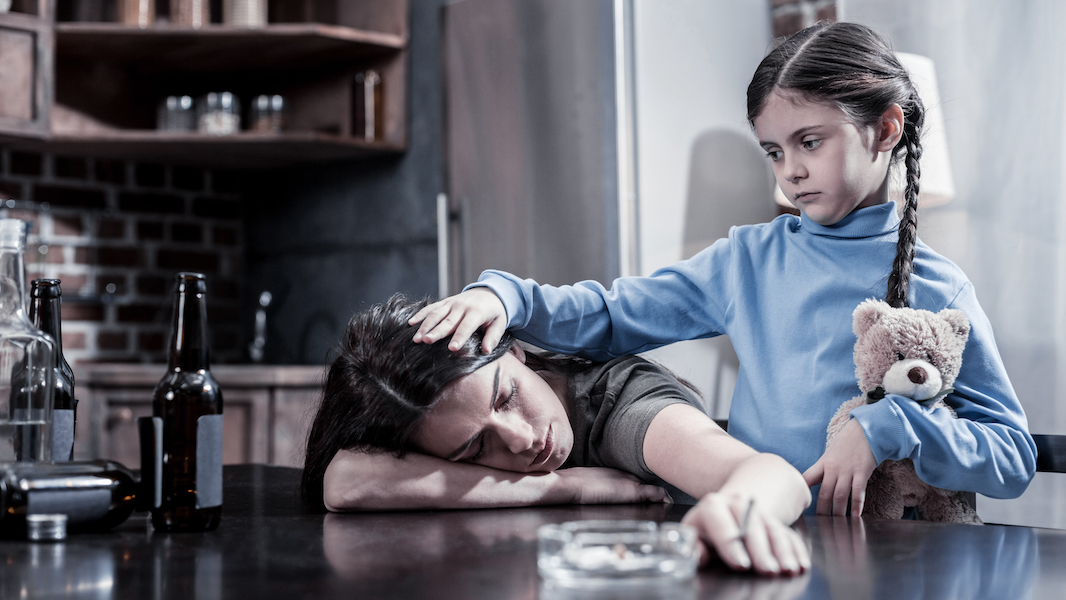
Caring for others
These children often take on care responsibilities within the family, looking after parents or siblings, including practical tasks, like cooking, housework and shopping, and physical care or emotional support.
Being a young carer can lead to stress and social isolation, and impact educational attendance and achievement. Opportunities such as after school activities, university, or leaving home can seem impossible.
“Evenings were full of worries and responsibilities. I would check doors were locked and that my little brother and I had something to eat. Making sure Mum wouldn’t burn in front of the fire and helping her to bed was an often-nightly routine.”
Ashleigh
Fetal Alcohol Spectrum Disorder (FASD)
Drinking during pregnancy can affect the baby’s development and lead to lifelong problems with:
💬 movement, balance, vision and hearing
💬 thinking, concentration, and memory
💬 emotional regulation and social skills
💬 hyperactivity and impulse control
💬 communication
💬 joints, muscles, bones and organs
FASD is often undiagnosed or misdiagnosed. It is a leading cause of intellectual disability and affects more people than Autism. For advice, see The National Organisation for FASD

Supporting students affected by their parent’s drinking
Listen non-judgementally
Reassure them that it’s OK to talk about their experiences and feelings. It’s not being disloyal to their parent.
Keep the focus on the child as an individual, encouraging them to talk about their own needs, rather than those of the family.
Try not to make negative comments about their parent. Alcohol problems are not about lack of love or willpower, and children do not want their parents to be judged.
Don’t share the child’s problems with others who do not need to know.
Many children fear they will not be believed. When you acknowledge their experience, you will validate their feelings and help them make sense of the chaos.
“I was fiercely protective of mum. I would be very upset if people spoke to me about her in a negative light, even if it was coming from a family member.”
SJ
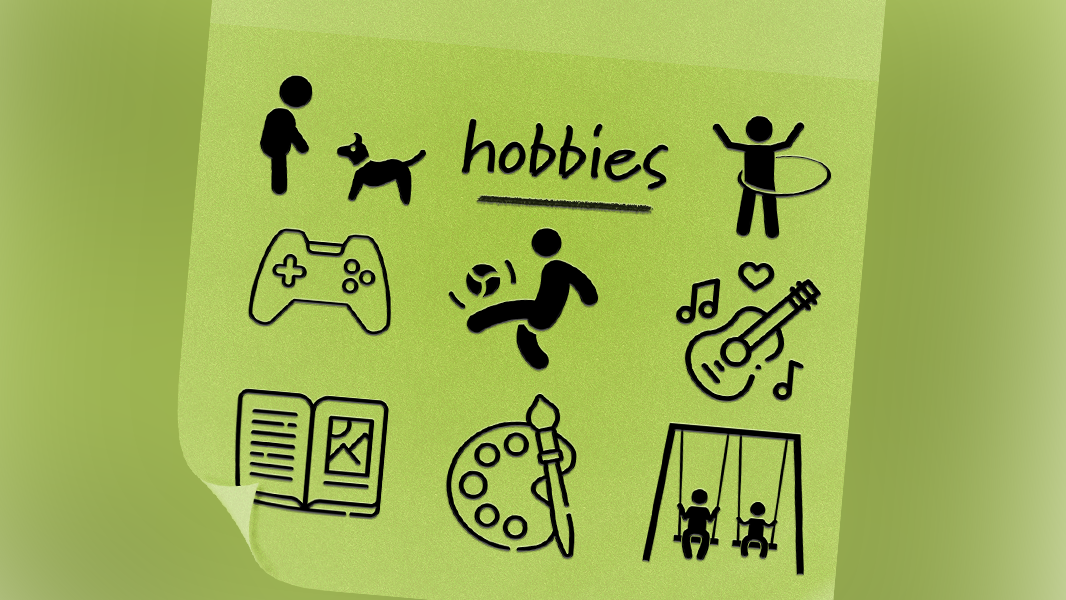
Help them do things they enjoy
Remind them that they are important. Sometimes worries can take over. Taking a break can help.
Encourage them to find time for activities they like.
Perhaps help them find an after-school, youth, sports or holiday club.
Hobbies provide an opportunity to develop relationships and give a sense of accomplishment and independence.
Help them develop healthy coping mechanisms
Let them know it is OK to feel however they are feeling. Feelings come and go.
Encourage students to find positive ways to express themselves, such as talking, helping them contact Nacoa, writing a journal (which could be kept at school), drawing, or physical activity.
Perhaps having a quiet place to do homework after school or to revise during study leave may help.
Keeping children safe
If you are concerned about a child or young person, follow your school’s safeguarding procedures.
Children are often wary about the situation being taken out of their control. Try to keep them informed about what you can do and who else you need to talk to.
Remind children that if they are frightened, they can contact Nacoa or ChildLine for help, and to dial 999 in an emergency. Help them identify ‘safe places’ they can go if needed.

Talk about alcohol problems
Talking about alcohol problems and addiction can reduce stigma and enable people to ask for help now or in the future.
Provide information about alcohol and the impact on families, such as from Nacoa’s website. It can be helpful to relate to videos or books.
It’s good to say when you don’t know or don’t have the answer. It’s empowering for children to know that adults don’t know everything.
Can you raise awareness within the whole class or school?
- Incorporate learning about alcohol into classroom teaching
- Teach about feelings, coping mechanisms and the Nacoa 6 Cs
- Display leaflets and posters
- Invite a Nacoa volunteer to give a presentation
- Organise a fundraising event during International COA Week
Let them know…
✅ Their parent’s drinking is not their fault.
✅ Sometimes alcohol makes people do or say things that they would not normally do.
✅ Alcohol problems are like an illness where people have lost control over their drinking. They continue to drink even when it is affecting their lives, their health and people around them.
✅ People with alcohol problems usually need help to stop. There is help, but as hard as it is for those around them, only the person drinking can make the decision to accept help.
✅ They can’t control their parent’s drinking. Don’t hide bottles or try to be perfect.
✅ They can feel better whether their parent drinks or not.
✅ Many families keep alcohol problems a secret, so it can feel like they are the only one going through this. 1 in 5 children in the UK live with a parent who drinks too much.
✅ It is OK to talk about what’s going on and how they are feeling. Talking with someone they trust is not being disloyal to their family and can help them feel better. It could be someone in their family, a friend, a teacher or someone else.
✅ They are not alone. There is help. They can always talk to Nacoa.
Encourage them to remember the six Cs:
I didn’t cause it
I can’t cure it
I can’t control it
I can take care of myself
I can communicate my feelings
I can make healthy choices
Help students access resources and support
Seeing what it’s like for others in similar situations can help children feel less alone. They can read experiences on Nacoa’s website, talk online on the Nacoa message boards, or speak to the Nacoa helpline.
Is there also a school counsellor or other local counselling or Young Carers service you could refer them to?
We are here for your students and you.
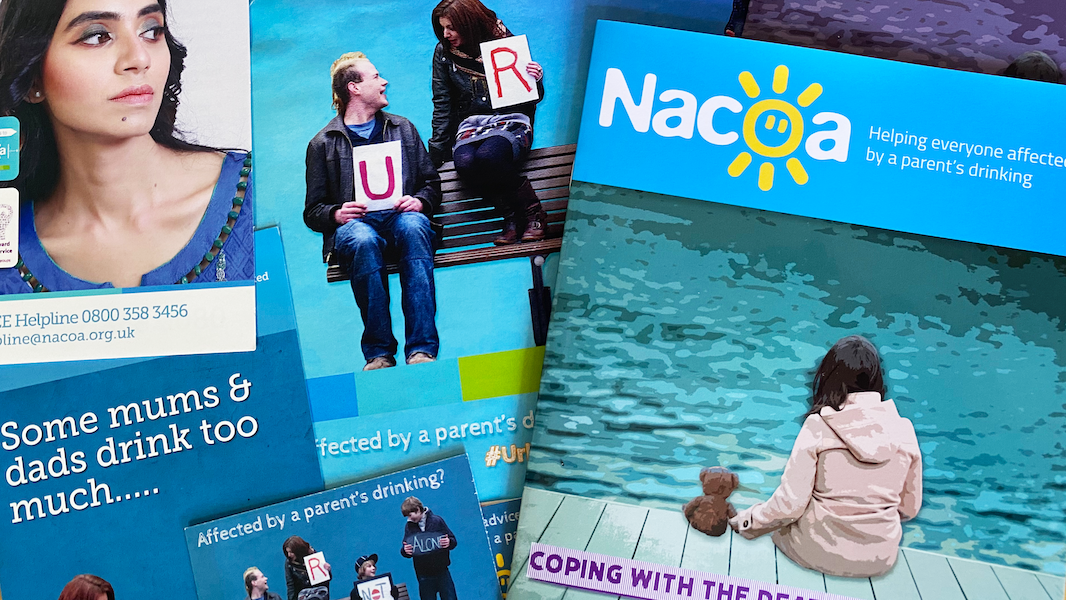
“The resources you sent were so helpful. It was good to be so well informed and the books are beautiful so thank you. We had a meeting with the parent which went well and we’re going to start sharing the resources with the pupil.”
Jane, School Pastoral Support Manager
Books
Online resources
Videos
Short film for children showing what it can be like when a parent drinks too much and how Nacoa can help

























































































